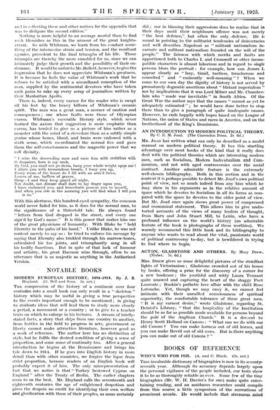NOTABLE BOOKS
MODERN EUROPEAN HISTORY, 1494-1914. By J. S. Hoyland. (G. Bell and Sons. 5s. net.) THE compression of the history of a continent over four centuties :into a small book can only result in a " skeleton "
history which may be useful in giving a true perspective to the events important enough to be mentioned ; in giving
to students ideas that will lead them to study more closely a period, a movement or a country ; or to give to a teacher texts on which to enlarge in his lectures. A stream of briefly- stated facts, a story that skips from one country to another, from battles in the field to progress in arts, government or liberty cannot make attractive literature, however good as a work of reference. The author here has no distinction of style, but he fulfils the desired condition of giving a sense of proportion, and some sense of continuity too. After a general introduction he begins at the Renaissance and brings his tale down to 1914. If he goes into English history in more detail than with other countries, we forgive the lapse from strict proportion, because readers of an English book will probably expect it of him. The only misrepresentation of fact that we notice is that " Turkey bestowed Cyprus on England " after the Treaty of Berlin. The earlier chapters seem to us the best. Mr. Hoyland calls the seventeenth and eighteenth centuries the age of enlightened, despotism and gives the despots no credit for identifying their own welfare and glorification with those of their peoples, as some certainly did ; nor in blaming their aggressions does-he realize that in their days amid their neighbours offence was not merely ".the best defence,", but often the only –defence: ' He is sound m pointing to the militarist tendencies of deMocracies and well describes Napoleon' as " militant nationalism in- carnate and militant nationalism founded on the will of the people." The fairness with which .merits and faults are apportioned both to Charles I. and Cromwell or other incom- patible characters is almost laborious and in regard to single persons blurs the portrait : for example, how can James I. appear clearly as " lazy, timid, tactless, treacherous and conceited " and " eminently well-meaning " ? When we come to our own day the dignity of history is not served by prematurely dogmatic assertions about " blatant imperialism " nor by implications that it was Lord Milner and Mr. Chamber- lain who " made war inevitable " in South Africa. Of the Great War the author says that the causes " cannot as yet be adequately estimated " ; he would have done better to stop there than to give a paragraph of quite inadequate causes. However, he ends happily with hopes based on the League of Nations, the union of States and races in America, and on the brotherhood of the King's Dominions.














































 Previous page
Previous page